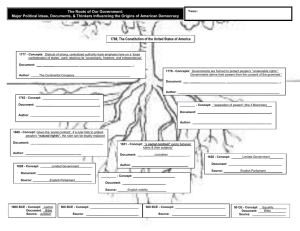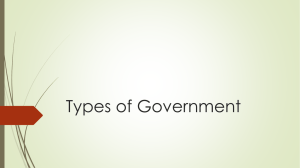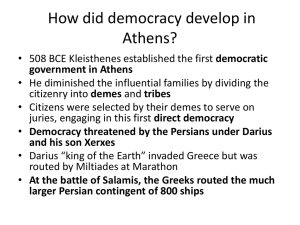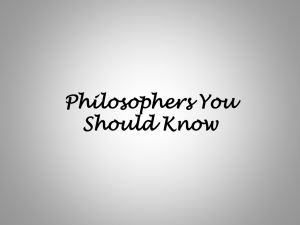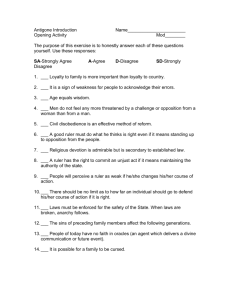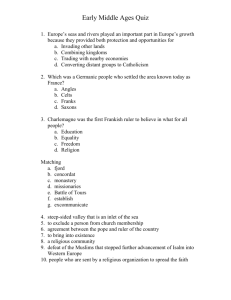Classical Empires SOAPSTONE WARMUPS AND DBQ PREP
advertisement
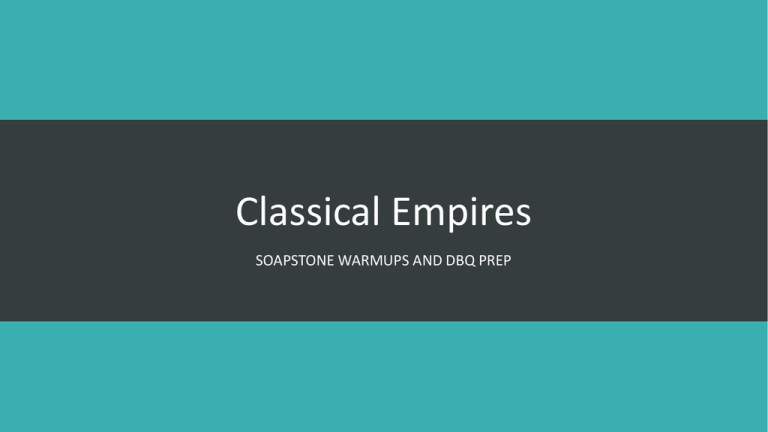
Classical Empires SOAPSTONE WARMUPS AND DBQ PREP Document Analysis #1 - Pericles Pericles’ Funeral Oration, Athenian Leader during Peloponnesian War, 430 BC “Our constitution does not copy the laws of neighboring states; we are rather a pattern to others. Its administration favors the many instead of the few. If we look to the laws, they afford equal Justice; if to social standing advancement in public life falls to reputation for capacity, class considerations not being allowed to interfere with arête, nor does poverty bar the way. If a man is able to serve the state, he is not hindered by the obscurity of his condition fear is our chief safeguard, teaching us to obey those in office and the laws.” 1. Who is the Speaker of this document? Make sure to include historical facts about them that would be relevant to interpreting the meaning of this text. 2. Who is the Audience of this document? Provide evidence from the text. 3. The Greek term arête can be translated as “moral virtue; living up to one’s full potential.” According to Pericles, how does arête influence government in Athens? Document Analysis #2 - Greece Plutarch, Greco-Roman historian, 1st/2nd century CE, from his biography on Pericles, ruler of Athens during the 5th century BCE “Those who were of the right age and were strong could earn generous pay from public funds for military service, but as regards the artisans, he did not want them to be without share in the city’s profits, so he put forward before the people ambitious building projects and plans for constructions which would provide work for many different crafts. In this way the population, which stayed at home would have cause to benefit from and have a share in public funds no less than those who paid a salary manned the ships, carried out garrison duties, went on campaign, or administered the city as paid officials.” 1. How does Pericles use the Athenian government to help citizens besides those that serve in the bureaucracy or military? 2. Describe the tone of this document and give an example from the text that reflects it. Document Analysis #3 - Persia Herodotus, Greek Historian, from his Histories, How Darius Became Ruler of Persia, 5th century BCE This [empire] he set up in Persia; and afterwards he proceeded to establish twenty governments of the kind which the Persians call satrapies, assigning to each its governor, and fixing the tribute which was to be paid him by the several nations. And generally he joined together in one satrapy the nations that were neighbors, but sometimes he passed over the nearer tribes, and put in their stead those which were more remote. The following is an account of these governments, and of the yearly tribute which they paid to the king: Such as brought their tribute in silver were ordered to pay according to the Babylonian talent. […] During all the reign of Cyrus, and afterwards when Cambyses ruled, there were no fixed tributes, but the nations severally brought gifts to the king. On account of this and other like doings, the Persians say that Darius was a huckster, […] and Cyrus a father; for Darius looked to making a gain in everything; […] while Cyrus was gentle, and procured them all manner of goods. 1. What is the subject of this document? 2. What is a satrap, and what purpose does it serve in Persia? 3. What did Darius and Cyrus do to get their reputations as rulers? What might this suggest about the difficulty of maintaining an empire? Document Analysis #4 Plutarch, Greco-Roman historian, 1st/2nd century CE, from his biography on Pericles, ruler of Athens during the 5th century BCE “Those who were of the right age and were strong could earn generous pay from public funds for military service, but as regards the artisans, he did not want them to be without share in the city’s profits, so he put forward before the people ambitious building projects and plans for constructions which would provide work for many different crafts. In this way the population, which stayed at home would have cause to benefit from and have a share in public funds no less than those who paid a salary manned the ships, carried out garrison duties, went on campaign, or administered the city as paid officials.” 1. What similarities do you see between these documents? 2. What differences do you see between these documents? 3. What do these documents suggest about the benefits & drawbacks of empires for their citizens? Herodotus, Greek Historian, from his Histories, How Darius Became Ruler of Persia, 5th century BCE This [empire] he set up in Persia; and afterwards he proceeded to establish twenty governments of the kind which the Persians call satrapies, assigning to each its governor, and fixing the tribute which was to be paid him by the several nations. And generally he joined together in one satrapy the nations that were neighbors, but sometimes he passed over the nearer tribes, and put in their stead those which were more remote. The following is an account of these governments, and of the yearly tribute which they paid to the king: Such as brought their tribute in silver were ordered to pay according to the Babylonian talent. […] During all the reign of Cyrus, and afterwards when Cambyses ruled, there were no fixed tributes, but the nations severally brought gifts to the king. On account of this and other like doings, the Persians say that Darius was a huckster, […] and Cyrus a father; for Darius looked to making a gain in everything; […] while Cyrus was gentle, and procured them all manner of goods. Document Analysis #5 - India Megasthenese, Seleucid (Greek) Ambassador to Chandragupta Maurya, 305 BCE, his comments on India “The imperial army is divided into four parts including 600,000 foot soldiers, cavalry of 30,000, 9,000 war elephants utilizing 36,000 men and 10,000 war chariots with contingents of 24,000. From the capital a war council of thirty officials and six committees oversees war plans. The soldiers lead a life of supreme freedom and enjoyment. They have only military duties. They await and train for war.” 1. Who is the Speaker of this document? Make sure to include historical facts about them that would be relevant to interpreting the meaning of this text. 2. What is the Occasion of this document? Address both the historical timeframe (when/where this was written) & immediate occasion (the events that prompted this writing) 3. Who is the Audience of this document? How does that influence the document’s content or meaning? Document Analysis #6 - Rome Tacitus, Roman historian, from Agricola, biography of the governor of Britain, AD 78-84 “People that are scattered and uncivilized are quick to fight. To make them ready to accept peace and leisure he had to prove how pleasant these are, so he encouraged individuals and communities alike, and gave them official assistance to build temples, town centers, and houses, praising all who cooperated, and rebuking anyone who was reluctant. He went on to make sure sons of the chieftains had a proper education. Consequently, men who had a short time before refused to learn Latin were now keen to speak it fluently. In their simplicity they called it civilization – it was in fact merely one method of keeping them quiet.” 1. What is the occasion of this document? Make sure to address both the historical timeframe (when/where) and immediate occasion (the events that prompted this writing). 2. According to Tacitus, what do the leaders of empires gain from making their peoples “civilized?” Document Analysis #7 - China Han fei tzu, Legalist philosopher and advisor to Qin dynasty kings, 5th century BCE “If the laws are weak, so is the kingdom. The ruler alone should possess the power; if the ministers shut out the ruler, then he loses the effectiveness of his position. If they control wealth and resources, he loses the means of dispensing bounty. If they issue orders as they please, he loses the means of command. If they are able to carry out righteous deeds in their own name, he loses his claim to enlightenment. And if they can build up factions of their own, he loses his supporters. All these are rights that should be exercised by a ruler alone; they should never pass into the hands of his ministers.” 1. Who is the Speaker of this document? (Hint: Even if you don’t know who Han Fei Tzu is, what can you know about him from his role in the dynasty & philosophical views?) 2. Who is the Audience of this document? How might the audience affect the content of this document? 3. According to Han Fei Tzu, why should all the power in a kingdom belong to the ruler? Document Analysis #9 - Rome Aelius Aristides, Greco-Roman writer, his public writings, 150 CE “Most wonderful of all is your noble idea of citizenship. For you have divided all the people of the empire into two groups. The more cultured, better born, and more influential everywhere you have declared Roman citizens. Everything lies open to everybody, and no one who is worthy to be trusted with public office is considered a foreigner. There are many people in each city who are citizens. You have no need to keep troops in these cities; the most influential men everywhere keep watch over their own native places for you. You have a double hold on these cities – from Rome and through the Roman citizens in each.” Tacitus, Roman historian, from Agricola, biography of the governor of Britain, AD 78-84 “People that are scattered and uncivilized are quick to fight. To make them ready to accept peace and leisure he had to prove how pleasant these are, so he encouraged individuals and communities alike, and gave them official assistance to build temples, town centers, and houses, praising all who cooperated, and rebuking anyone who was reluctant. He went on to make sure sons of the chieftains had a proper education. Consequently, men who had a short time before refused to learn Latin were now keen to speak it fluently. In their simplicity they called it civilization – it was in fact merely one method of keeping them quiet.” 1. What is the occasion of these documents? 2. What differences do you see between Aelius Aristides’ and Tacitus’ views on empires? 3. Based on these documents, what benefits or disadvantages do empires have for their peoples? Document Analysis #8 - China Inscription on a Chinese tower Built by Chin Shih Huang-di, 3rd century BCE A new age is inaugurated by the Emperor; Rules and measures are rectified, Farming is encouraged, secondary pursuits discouraged, Tools and measures [weights and coins] are made uniform, The written script is standardized; For our Emperor in accordance with the time Has regulated local customs, Made waterways and built roads, Divided up the land High and low, noble and humble, None dare overshoot the mark; The common people know peace And have laid aside weapons and armor; There are no robbers or thieves; Men delight in his rule, All understanding the law and discipline. The universe entire Is our Emperor's realm. 1. Who is the speaker of this document? 2. What is the occasion of this document? 3. Who is the audience of this document? 4. What is the purpose of this document? Document Analysis #10 - Japan The Japanese Reform Edict of Taika, 646 CE “The capital shall be placed under an administrative system. Governors and prefects shall be appointed. Barriers and outposts shall be erected, and guards and post horses for transportation and communication purposes shall be provided. Furthermore bell-tokens shall be made and mountains and rivers shall be regulated. It is hereby decreed that the household registers, tax registers, and rules for allocation and redistribution of land shall be established. In each village there shall be appointed an alderman. He shall be responsible for the maintenance of the household registers, the assigning of sowing of crops and cultivation of mulberry trees, prevention of offenses, and requisitioning of taxes and forced labor. Old taxes and forced labor shall be replaced by a system of commuted taxes based on the size of rice fields. These taxes shall consist of fine silk. A separate household tax shall also be levied and each shall pay in cloth and salt.” These reforms were issued by Emperor Kotoku’s government, who united Japan into an empire under one ruler. 1. Who is the audience of this document? Provide textual evidence. 2. What is the purpose of this document? 3. What similarities do you see between this document and the Confucian ideas of China?
![This [empire] he set up in Persia; and afterwards he... governments of the kind which the Persians call satrapies, assigning... Histories Persia, 5](http://s2.studylib.net/store/data/015577482_1-6df1abb7e9538fea395f91c091a7ccda-300x300.png)
